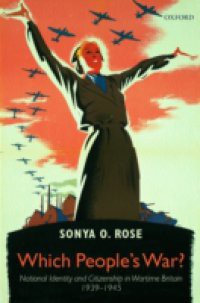Which People's War? examines how national belonging, or British national identity, was envisaged in the public culture of the World War II home front. Using materials from newspapers, magazines, films, novels, diaries, letters, and all sorts of public documents, it explores such questions as: who was included as 'British' and what did it mean to be British? How did the British describe themselves as a singular people, and what were the consequences of thosedepictions? It also examines the several meanings of citizenship elaborated in various discussions concerning the British nation at war. This investigation of the powerful constructions of national identity and understandings of citizenship circulating in Britain during the Second World War exposes theirmultiple and contradictory consequences at the time. It reveals the fragility of any singular conception of 'Britishness' even during a war that involved the total mobilization of the country's citizenry and cost 400,000 British civilian lives.

